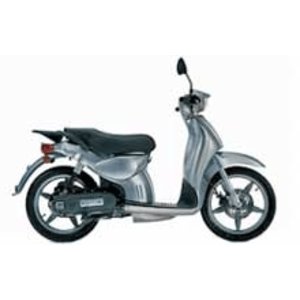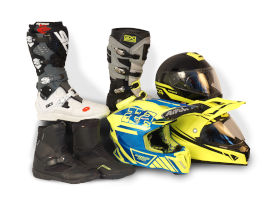Aprilia Scarabeo 50 4T (2004–2006): A Timeless Urban Companion
Introduction
The Aprilia Scarabeo 50 4T, produced between 2004 and 2006, is a scooter that embodies Italian flair and practicality in equal measure. Designed for urban mobility, this 50cc machine caters to riders seeking a stylish, efficient, and approachable two-wheeler. Whether navigating narrow city streets or cruising along boulevards, the Scarabeo 50 4T blends form and function in a way that still resonates with riders today. Let’s dive into what makes this scooter a standout in its class—and why it remains a beloved choice for commuters and enthusiasts alike.
Design and Styling: La Dolce Vita on Two Wheels
The Scarabeo 50 4T’s design is unmistakably Italian. Its rounded curves, chrome accents, and sleek bodywork give it a retro-modern aesthetic that stands out in a sea of bland commuter scooters. The 780 mm (30.7 in) seat height is accessible for riders of all statures, while the slim profile and 94 kg (207 lb) curb weight make it effortless to maneuver at low speeds or when parking in tight spaces.
The scooter’s practicality shines through details like its under-seat storage compartment, which can fit a helmet or groceries, and the robust metal finish on components like the mirrors and handlebars. The analog instrument cluster is minimalist but legible, featuring a speedometer, fuel gauge, and odometer. Color options during its production years ranged from vibrant reds and blues to understated silvers, ensuring there was a Scarabeo to match every personality.
Performance and Handling: City Slicker
Powered by a 49cc single-cylinder 4-stroke engine, the Scarabeo 50 4T delivers a modest 3.4 PS (2.5 kW)—enough for its intended urban duties. Top speed is restricted to around 45 km/h (28 mph) to comply with moped regulations, but the engine’s smooth power delivery and belt-driven transmission make it a joy to ride in stop-and-go traffic. Throttle response is crisp, and the absence of a manual gearbox (thanks to its automatic CVT) simplifies the riding experience for beginners.
Where the Scarabeo truly excels is in its handling. The telescopic front fork and rear shock absorbers are tuned for comfort, soaking up potholes and uneven pavement without feeling wallowy. At 94 kg, flicking this scooter through crowded streets or weaving between cars feels almost intuitive. The braking system—likely a front disc and rear drum combo, given the DOT 4 brake fluid requirement—provides adequate stopping power, though it benefits from periodic maintenance to keep it responsive.
Fuel efficiency is a strong suit. With an 8-liter (2.1-gallon) tank and an estimated consumption of 40–50 km/l (94–118 mpg), riders can enjoy weeks of commuting between fill-ups.
Technology and Features: Simple Yet Effective
The Scarabeo 50 4T isn’t packed with cutting-edge tech, but it nails the essentials. The air-cooled engine avoids the complexity of liquid cooling, reducing maintenance needs, while the fuel system—likely a carburetor despite the "Einspritzung" mention in the data—is reliable and easy to tune. (Note: Some confusion exists in the provided specs; most 50cc scooters of this era used carburetors.)
Practical features include a dual-seat design with ample grip for passengers, a built-in luggage rack, and a center stand that makes parking secure. The lack of weather protection (like a larger windscreen) is a minor drawback, but aftermarket options can easily remedy this.
Competition: How Does the Scarabeo Stack Up?
In the mid-2000s, the Scarabeo 50 4T faced fierce competition:
- Honda Vision 50: The Vision prioritized reliability over style, with a similarly frugal engine but bland aesthetics. The Scarabeo wins on design, though Honda’s build quality is tough to beat.
- Yamaha Aerox 50: A sportier rival with sharper handling, the Aerox appealed to younger riders but sacrificed comfort and storage space.
- Peugeot Speedfight 50: Known for its aggressive styling and tunability, the Speedfight was a favorite for customization but lacked the Scarabeo’s refinement.
The Scarabeo’s blend of Italian elegance, user-friendly ergonomics, and practical features gave it a unique niche. It’s less about outright performance and more about enjoying the ride—a philosophy that still resonates.
Maintenance: Keeping Your Scarabeo in Top Shape
Owners of the Scarabeo 50 4T will appreciate its straightforward maintenance needs:
- Engine Care: The air-cooled engine requires regular oil changes (every 2,000 km/1,240 mi). Use a high-quality 10W-40 oil to ensure longevity.
- Belt Drive: Inspect the drive belt every 5,000 km (3,100 mi) for wear. Replacement is straightforward, and MOTOPARTS.store stocks durable aftermarket belts.
- Spark Plugs: The NGK CR9EB is standard, but upgrading to the iridium CR9EIX (available on our site) can improve cold starts and fuel efficiency.
- Brakes: Flush the DOT 4 fluid annually to maintain braking performance. Check pad thickness during tire changes.
- Tires: The lightweight frame pairs well with grippy city tires. Keep pressures at 2.0 bar (29 psi) front and 2.2 bar (32 psi) rear.
Common issues include carburetor clogging from stale fuel (fixable with a thorough cleaning) and aging rubber components like hoses. Fortunately, MOTOPARTS.store offers OEM-spec replacements for all wear items.
Conclusion: A Scooter with Soul
The Aprilia Scarabeo 50 4T isn’t just a tool for getting from A to B—it’s a statement. Its timeless design, forgiving ergonomics, and frugal operation make it a compelling choice for urban riders even today. While it won’t set speed records, it excels at putting a smile on your face during the daily grind.
For owners looking to preserve or personalize their Scarabeo, MOTOPARTS.store offers everything from performance upgrades to aesthetic enhancements. Whether you need a new drive belt, iridium spark plugs, or a custom seat cover, we’ve got your back. After all, the journey is better when your scooter feels like an extension of yourself.
Specifications sheet
| Engine | |
|---|---|
| Stroke: | Four-stroke |
| Max power: | 2 kW | 3.0 hp |
| Max torque: | None Nm |
| Fuel system: | Fuel Injection |
| Max power @: | None rpm |
| Displacement: | 49 ccm |
| Max torque @: | None rpm |
| Configuration: | Single |
| Compression ratio: | None |
| Number of cylinders: | 1 |
| Dimensions | |
|---|---|
| Wheelbase: | None |
| Dry weight: | 94 |
| Wet weight: | None |
| Seat height: | 780 mm (30.7 in) |
| Overall width: | None |
| Overall height: | None |
| Overall length: | None |
| Ground clearance: | None |
| Fuel tank capacity: | 8.0 L (2.1 US gal) |
| Drivetrain | |
|---|---|
| Final drive: | belt |
| Transmission: | Automatic CVT |
| Maintenance | |
|---|---|
| Rear tire: | 120/70-12 (infe--ed) |
| Engine oil: | 10W-40 |
| Front tire: | 120/70-12 (infe--ed) |
| Break fluid: | DOT 4 |
| Spark plugs: | NGK CR9EB or NGK CR9EIX |
| Spark plug gap: | 0.6 |
| Coolant capacity: | None |
| Forks oil capacity: | None |
| Engine oil capacity: | 1.0 |
| Engine oil change interval: | Every 5000 km or annually |
| Valve clearance (intake, cold): | None |
| Valve clearance check interval: | None |
| Valve clearance (exhaust, cold): | None |
| Recommended tire pressure (rear): | None |
| Recommended tire pressure (front): | None |
| Chassis and Suspension | |
|---|---|
| Frame: | None |
| Rear brakes: | Single disc |
| Front brakes: | Single disc |
| Rear suspension: | Single shock absorber |
| Front suspension: | Telescopic fork |
| Rear wheel travel: | None |
| Front wheel travel: | None |



















